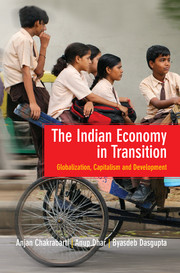Book contents
- Frontmatter
- Contents
- Preface
- Introduction
- Chapter I The Condition of the Working Class in Contemporary India
- Chapter II Capitalism: The ‘Delusive Appearance of Things’
- Chapter III Post-colonial Development and ‘The Thought of the Outside’
- Chapter IV The Word and the World of Neo-liberalism
- Chapter V The Scrypt of Transition: Between the Spectral and the Secret Thereof
- Chapter VI From Self-reliance to Neo-liberalism: The Political Economy of ‘Reform’ (1991–2014)
- Chapter VII Global Capitalism and World of the Third: The Emergent Cartography of the Indian Economy
- Chapter VIII Inclusive Development, State and Violence
- Chapter IX From Economic Crisis to Transition Crisis
- Conclusion
- Bibliography
- Author Index
- Subject Index
Chapter IX - From Economic Crisis to Transition Crisis
Published online by Cambridge University Press: 18 December 2015
- Frontmatter
- Contents
- Preface
- Introduction
- Chapter I The Condition of the Working Class in Contemporary India
- Chapter II Capitalism: The ‘Delusive Appearance of Things’
- Chapter III Post-colonial Development and ‘The Thought of the Outside’
- Chapter IV The Word and the World of Neo-liberalism
- Chapter V The Scrypt of Transition: Between the Spectral and the Secret Thereof
- Chapter VI From Self-reliance to Neo-liberalism: The Political Economy of ‘Reform’ (1991–2014)
- Chapter VII Global Capitalism and World of the Third: The Emergent Cartography of the Indian Economy
- Chapter VIII Inclusive Development, State and Violence
- Chapter IX From Economic Crisis to Transition Crisis
- Conclusion
- Bibliography
- Author Index
- Subject Index
Summary
Following the global financial crisis, economic instability hit India as well and produced a crisis in its hub and circuits of global capital. From there it spread via the local–global market to the distant margins encompassing in the process the less well off sections. With the high growth rate regime facing serious sustainability threat, the trope of inclusive development/growth too became exposed to shocks, including financial/budgetary pressure; how far the purportedly ‘populist’ programs of inclusive development can be sustained has suddenly become an object of discussion. Moreover, the somewhat persistent inflation rate must have negatively affected, in the words of RBI (2013), the poor and the old (including pensioners), and also, the fixed income groups of people. High inflation and falling growth rate stand for trouble in macroeconomics. If one adds ‘jobless’ growth and exchange rate instability, the problem is accentuated. Overall, India's micro economy, macro economy and social program have become vulnerable to the combined effects of external and domestic forces in a manner that has, at least temporarily, reversed India's high growth rate track record, and threatens to undo the very idea of inclusive development. It amounts to a disruption of the new order of things as it stands now. How has the Indian state responded? What was and is its strategy of exiting from the current economic crisis? Does it map a new transitional trajectory? What became of India's policy paradigm?
At this point, it will be topical to discuss two related matters of significance. The first is the response of developed countries to the global economic crisis (by no means uniform), and then counterpoising India's policy response in that broader context. India's crisis management will be one topic to be covered here. Second, we will examine problems in the basic consensus of macroeconomics in the backdrop of economic crisis, and ask what it entails for the policy paradigm? It may invite an attack on the neo-liberal form of the circuits-camp of global capital either by justifying the active role of state in the economy (a supposedly modified Keynesian position), or by surpassing the system itself to create a new order (a more radical position).
- Type
- Chapter
- Information
- The Indian Economy in TransitionGlobalization, Capitalism and Development, pp. 339 - 382Publisher: Cambridge University PressPrint publication year: 2015
- 1
- Cited by



